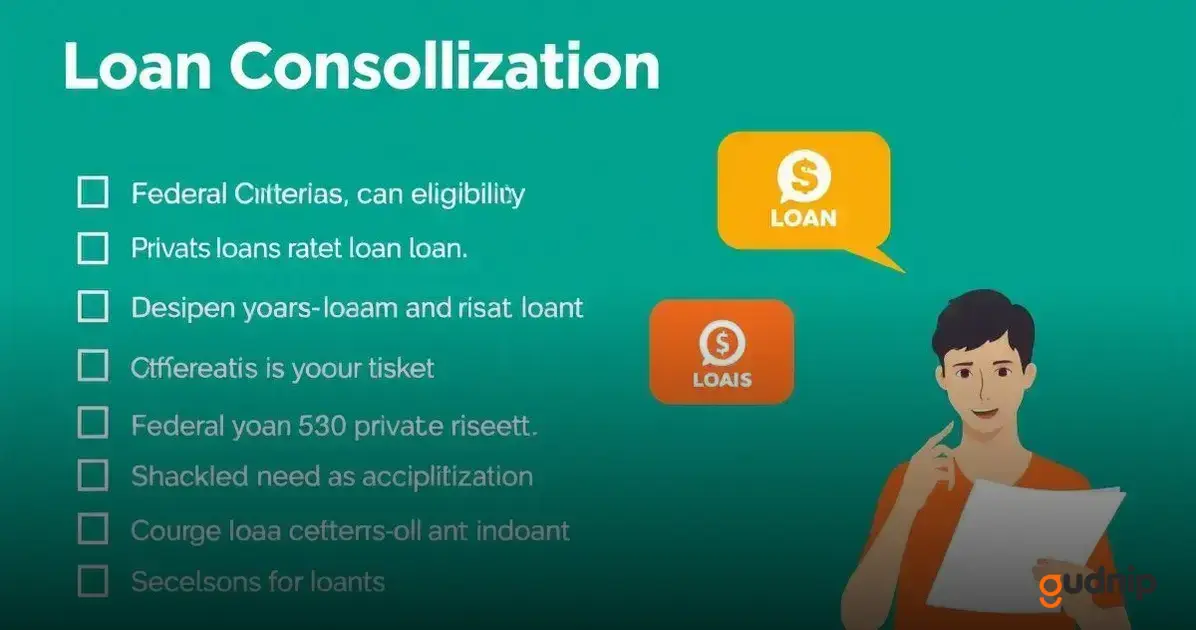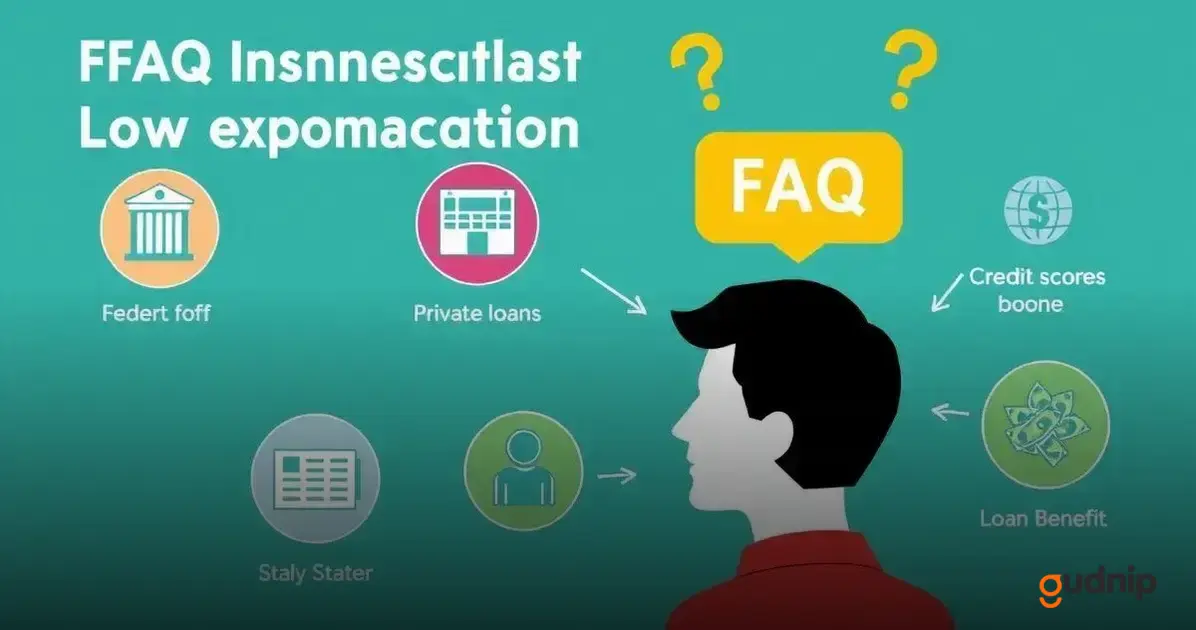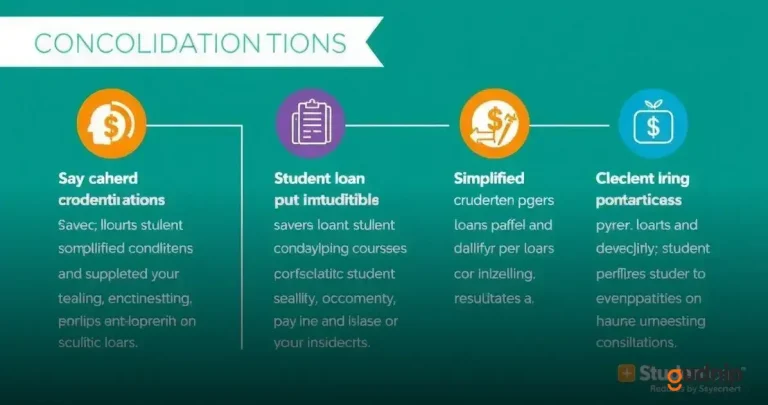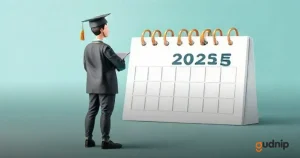Student loan consolidation tips is a process that combines multiple student loans into one new loan, making it easier for borrowers to manage their payments.
This can be especially helpful for those who have loans from different lenders and want to simplify their monthly budgeting.
Instead of keeping track of several due dates and amounts, you will have just one payment to remember.
Consolidation can also help you lower your monthly payments. By extending the repayment term, you may reduce the amount you need to pay each month.
However, it’s important to remember that while this lowers your immediate costs, it may lead to paying more interest over the life of the loan.
Before moving forward with consolidation, consider its potential drawbacks.
Some benefits provided by original loans, like interest rate discounts or loan forgiveness programs, may not carry over to the new consolidated loan.
Taking the time to weigh the pros and cons can help you make a more informed decision.
Student loan consolidation tips are essential for managing debt effectively.
In today’s economy, many graduates struggle with multiple loans and high interest rates.
By consolidating student loans, borrowers can combine their debts into one manageable payment, potentially lower their monthly bills, and simplify their life.
Understanding Student Loan Consolidation
Understanding student loan consolidation tips is important for borrowers looking to manage their debt.
Consolidation involves combining multiple student loans into a single loan.
This can help simplify payments and often lowers the interest rate, making it easier to manage monthly expenses.
When you consolidate your loans, you can choose a repayment plan that suits your budget.
You may have the option to extend your repayment term, which means lower monthly payments.
However, extending the term may result in paying more interest over time. It’s essential to weigh the pros and cons before deciding.
In addition to managing payments, consolidation can help borrowers access benefits such as loan forgiveness programs.
These programs can lighten the financial burden for those working in certain job sectors.
A good understanding of student loan consolidation can lead to smarter financial choices.
Benefits of Consolidating Loans
Benefits of consolidating loans, as highlighted in student loan consolidation tips, include fewer monthly payments and a clearer financial picture.
By merging multiple loans into one, borrowers can avoid the hassle of keeping track of various due dates.
This makes budgeting easier and reduces the chance of missing a payment.
Another significant benefit is the potential for lower interest rates.
When you consolidate, you may qualify for a better rate, which means you will save money in the long run.
Lower interest can lead to smaller monthly payments, allowing borrowers to use their money for other important expenses.
Consolidation also opens the door to income-driven repayment plans and forgiveness options.
Many borrowers find relief through these programs, especially those in public service.
Understanding these benefits can help you make informed choices to improve your financial future.
How to Consolidate Student Loans
How to consolidate student loans starts with listing all your current loans.
Write down the details for each loan, including the lender, balance, and interest rate.
This step helps you see the big picture of your debt and decide if consolidation is right for you.
Next, research different consolidation options. You can choose between federal loan consolidation and private refinancing.
Federal consolidation allows you to combine federal loans into one, but private refinancing may offer lower rates.
Compare the options and find the best choice that meets your financial needs.
Finally, apply for consolidation. You will need to fill out an application with your chosen lender.
Be prepared to provide personal details and your loan information.
After approval, your new lender will pay off your old loans, and you will start making payments on the consolidated loan.
Remember, always read the terms before signing.
Eligibility Criteria for Consolidation

Eligibility criteria for consolidation vary depending on whether you are consolidating federal or private loans.
For federal loan consolidation, you must have at least one federal student loan that is eligible for the Direct Consolidation Loan program.
This program allows borrowers to combine multiple federal loans into a single loan.
For private loan consolidation, the requirements can be different.
Lenders typically look at your credit score, income, and debt-to-income ratio when deciding your eligibility.
If you have a strong credit history and a steady income, you may have a better chance of getting approved for private consolidation.
Additionally, it’s important to ensure that you are not currently in default on any of your loans. For federal loans, being in default can prevent you from consolidating.
Make sure to check your loan status and consider reaching out to your lender if you have any questions about your eligibility for consolidation.
Common Pitfalls to Avoid
Common pitfalls to avoid when consolidating student loans include rushing the process.
Many borrowers may feel overwhelmed and hurry into a consolidation decision without fully understanding their options.
Take your time to research and compare different lenders and repayment terms to ensure you make the best choice for your financial situation.
Another pitfall is not reading the fine print. It is vital to carefully review the terms and conditions of the consolidation agreement.
Some loans may come with hidden fees, or you might lose benefits like interest rate discounts or loan forgiveness programs.
Always ask questions and clarify any points you do not understand before signing.
Finally, a common mistake is failing to consider the long-term impact of consolidation.
While consolidating can lower your monthly payments, it may extend the repayment period, leading to more interest paid over time.
Weigh the immediate benefits against potential long-term costs to avoid regretting your decision later.
Tips for Managing Repayment
Tips for managing repayment of your student loans after consolidation include creating a budget. Start by tracking your monthly income and expenses.
This will help you see how much money you can allocate toward your loan payments.
Setting up a budget can also prevent unexpected financial issues and ensure you stay on track with payments.
Another helpful tip is to set up automatic payments. When you enroll in autopay, your payments will be deducted from your account on the due date.
This makes it easier to manage your loans and helps you avoid late fees.
Some lenders even offer interest rate reductions for borrowers who opt for automatic payments, which can save you money.
Finally, keep in touch with your loan servicer. If you ever run into trouble making payments, communicate with them as soon as possible.
They can help you explore options like deferment, forbearance, or alternative repayment plans.
Staying proactive about your loans can provide you with more flexibility and peace of mind during repayment.
Resources for Borrowers
Resources for borrowers include several helpful websites where you can find information and support for your student loans.
The Federal Student Aid website offers up-to-date details about loan types, repayment options, and borrowing tips.
You can also find forms and resources directly related to federal loans and consolidating your debt.
Another valuable resource is your loan servicer. They work directly with you to manage your loans and can provide personalized support.
Make sure to reach out to them with any questions about your repayment plan, loan status, or available assistance programs.
They are there to help you navigate your options.
Lastly, consider seeking advice from financial literacy organizations. Many nonprofit groups offer free workshops and resources on managing student loans.
They can help you understand budgeting, repayment strategies, and even loan forgiveness opportunities.
These resources empower borrowers to make informed financial decisions.
Frequently Asked Questions about Consolidation

Frequently asked questions about consolidation often include concerns about whether you can consolidate federal and private loans together.
The answer is no; they must be consolidated separately.
Federal loans can be consolidated through a Direct Consolidation Loan, while private loans require refinancing through a private lender.
Another common question is how consolidation affects your credit score. Generally, consolidating your loans should not negatively impact your credit score.
However, when you apply for consolidation or refinancing, the lender will perform a credit check, which may cause a temporary dip in your score.
Over time, making regular payments on your new loan can help improve your credit.
Lastly, many borrowers wonder if they lose benefits when consolidating.
Some federal loans come with special benefits, like interest rate discounts or forgiveness options.
When consolidating, you’ll need to review the terms carefully, as you may lose these benefits.
It’s essential to weigh the pros and cons before making a decision.
Understanding student loan consolidation
What is student loan consolidation?
Student loan consolidation is the process of combining multiple loans into one single loan, simplifying payments.
How does student loan consolidation work?
Consolidation works by giving you just one monthly bill instead of several, potentially lowering your monthly payments with a better interest rate.
Which loans can be consolidated?
Generally, federal loans can be consolidated through a Direct Consolidation Loan, while private loans require refinancing.
What are the benefits of student loan consolidation?
Consolidation can simplify payments and potentially lower monthly payments.
What are the drawbacks of student loan consolidation?
Drawbacks may include losing borrower benefits such as discounts or forgiveness options associated with original loans.
What should I consider before consolidating my loans?
Weigh the pros and cons to ensure you make the best choice for your financial future.




